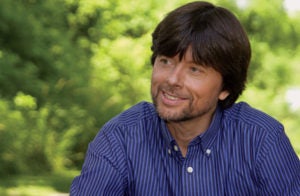Filmmaker Ken Burns will be Commencement speaker
Emmy Award-winner Ken Burns, who has directed and produced some of the most acclaimed historical documentaries ever made, will be Stanford’s 2016 Commencement speaker.
Stanford’s 125th Commencement Weekend is scheduled June 11 and 12. Burns will deliver the Commencement address at the university’s main ceremony in Stanford Stadium. The university’s seven schools also will hold individual ceremonies.
Since directing and producing the Academy Award-nominated Brooklyn Bridge in 1981, Burns has produced such award-winning documentaries as The Civil War; Baseball; Jazz; Statue of Liberty; Huey Long; Lewis and Clark: The Journey of the Corps of Discovery; Frank Lloyd Wright; Mark Twain; Unforgivable Blackness: The Rise and Fall of Jack Johnson; The War; The National Parks: America’s Best Idea; and The Roosevelts: An Intimate History.
In particular, Burns’ The Civil War is considered a masterpiece of documentary filmmaking. It was the highest-rated series in the history of American Public Television and attracted an audience of 40 million viewers during its premiere in September 1990. The New York Times said that Burns “takes his place as the most accomplished documentary filmmaker of his generation.”
Most recently, Burns produced a PBS documentary on Jackie Robinson, which will air in April. He is working on projects chronicling the Vietnam War, the history of country music, Ernest Hemingway and the history of stand-up comedy.
“Ken Burns is an extraordinary filmmaker who has revolutionized storytelling and, in the process, movingly brought to life American history and culture,” said President John Hennessy.
“He has an intellectual and thoughtful style that resonates with diverse audiences, especially in an age of frenetic filmmaking. His courageous and revolutionary vision has created the most transcendent and influential body of documentary film work of our generation. Our graduates will benefit immensely from hearing how he has leveraged compelling storytelling to make complex subjects accessible and to teach succeeding generations who we are as a people and what we value.”
Burns’ films have been honored with dozens of major awards, including 14 Emmy Awards, two Grammy Awards and two Oscar nominations. In 2008, at the News and Documentary Emmy Awards, he was honored by the Academy of Television Arts and Sciences with a Lifetime Achievement Award. Burns was recently selected to deliver the 2016 Jefferson Lecture in the Humanities. Sponsored by the National Endowment for the Humanities, the Jefferson Lecture is one of the highest honors bestowed by the federal government for distinguished intellectual achievement in the humanities.
“All of my subjects have been about American history, digging deep into what makes this America,” Burns recently told Parade magazine. “Each film asks that question. Who are we? Who are those strange and complicated people who like to call themselves Americans?”
Burns, a graduate of Hampshire College who makes his home in New Hampshire, is often attracted to subjects with the power to transcend and the capacity to coalesce people around a common cause. That is especially true of the story of Jackie Robinson, who endured unimaginable racism to become one of baseball’s most celebrated players.
“The kind of narrative I subscribe to trusts in the possibility that people could change,” Burns recently told a PBS interviewer.
On New Year’s Day this year, Burns served as the grand marshal of the Tournament of Roses in Pasadena, which includes the Rose Parade and the Rose Bowl. This year’s Rose Bowl pitted the Stanford Cardinal against the University of Iowa Hawkeyes. Burns claimed to have remained neutral, but acknowledged attending the football game with Stanford alumni.
“I cannot adequately describe how great an honor it is for me to be asked to give the Commencement address at Stanford University this year,” said Burns. “The young women and men who will be heading out into the world to start their lives in earnest face unique challenges and responsibilities. I hope to arm them with some perspectives.”

